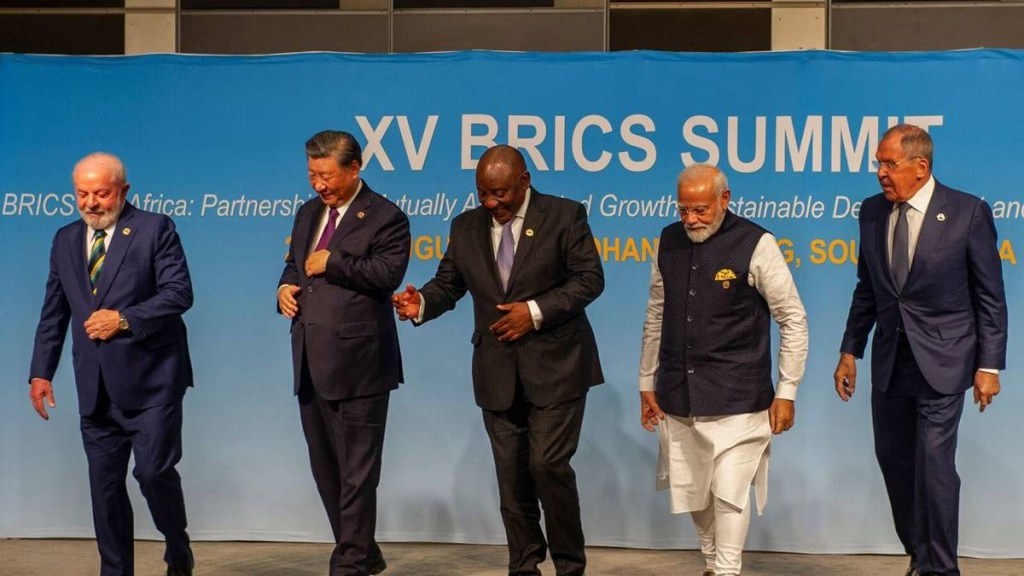The 15th BRICS summit witnessed a collective acknowledgement of the urgent need for efficient, affordable, and secure payment systems. Member nations emphasized the importance of fast, transparent, and inclusive cross-border payments. This unanimous commitment reflects the coalition’s determination to usher in a new era of financial cooperation.
As part of this initiative, the BRICS Payment Task Force (BPTF) is set to present a report on the mapping of the G20 Roadmap’s elements related to cross-border payments in BRICS countries. This collaborative approach highlights a coordinated effort to address cross-border payment challenges and enhance the international payment landscape.
Local Currency
A key focus of the summit was the promotion of local currencies in international trade and financial transactions. BRICS nations collectively endorsed the use of local currencies as a means to strengthen economic ties and facilitate seamless transactions between member nations and their trade partners. This step towards embracing local currencies signifies a significant leap towards balanced and fair trade practices.
The Johannesburg Declaration adopted today at the end of the three day 15th BRICS Summit celebrated the sharing of experiences among BRICS nations regarding payment infrastructures. The interlinking of cross-border payment systems emerged as a crucial point of discussion. This interconnected approach is anticipated to foster increased collaboration among BRICS nations, facilitating trade and investment flows while also encouraging meaningful dialogues on payment instruments.
This means India can now use its local currency to trade with countries like Brazil, Russia, South Africa, Iran, Ethiopia, Egypt, Saudi Arabia, Argentina, and others. It has already started transacting in India currency with UAE which will become a full member of the grouping starting January 1, 2024.
The declaration also emphasized the importance of correspondent banking networks between BRICS countries, facilitating settlements in local currencies. This strategic step aims to create an environment that supports international trade and financial interactions, ultimately contributing to robust economic growth.
In a bid to promote fair competition and establish a level playing field, BRICS nations expressed their commitment to deepening cooperation on competition. This effort seeks to nurture an environment conducive to equitable economic and trade collaboration, promoting balanced growth.
Internationalizing Rupee
India’s engagement in the summit was marked by its efforts to expand local currency settlement initiatives. India aims to establish bilateral agreements with nations like Brazil, Argentina, South Africa, Senegal, and Tanzania. These agreements would strengthen trade ties, promote economic relationships, and create more balanced trade partnerships.
The selection of partner nations for bilateral currency settlements aligns with India’s objective to cultivate trade relationships and balance trade dynamics. By collaborating with countries that exhibit either minor trade deficits or surpluses, India aims to leverage local currency agreements to foster equitable trading practices.
Trade relationships between India and its partner nations revolve around the exchange of vital commodities and raw materials. These interactions, ranging from grains and engineering goods to pharmaceuticals and petroleum products, play a pivotal role in promoting economic growth and resilience.
India’s successful bilateral currency settlement agreements with the UAE and Indonesia serve as noteworthy milestones. These successes provide impetus to India’s endeavors to replicate the initiative with neighboring nations, further streamlining trade transactions and advancing regional economic cooperation.
In addition to ongoing agreements, India is exploring local currency settlement plans with neighboring countries like Bangladesh and Sri Lanka. These initiatives aim to alleviate currency shortages and enhance regional economic ties.
In conclusion, the 15th BRICS summit serves as a cornerstone in advancing cross-border payment systems and embracing local currencies to fortify international trade. With a united approach, BRICS nations are laying the groundwork for an enhanced economic landscape that fosters growth, cooperation, and equity.

